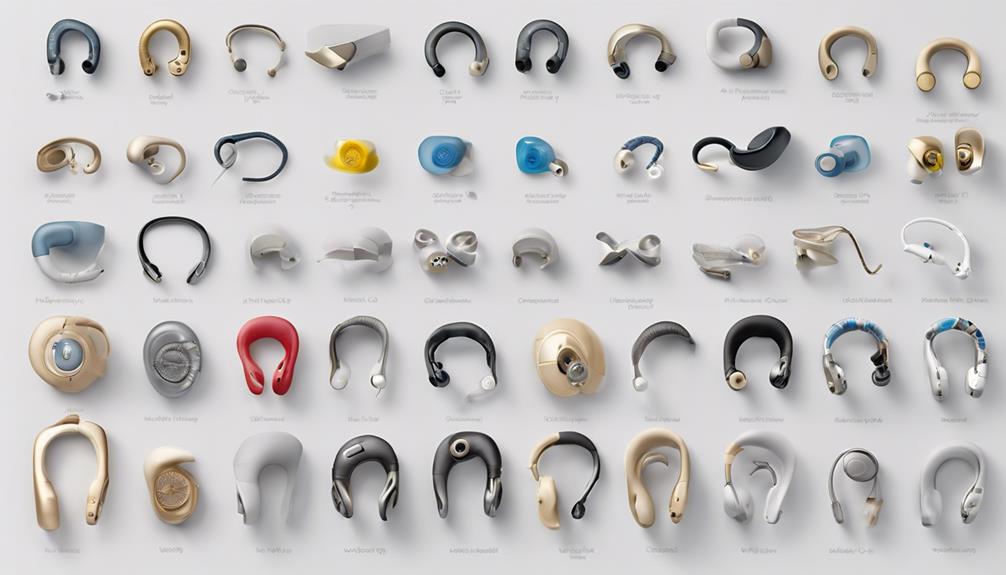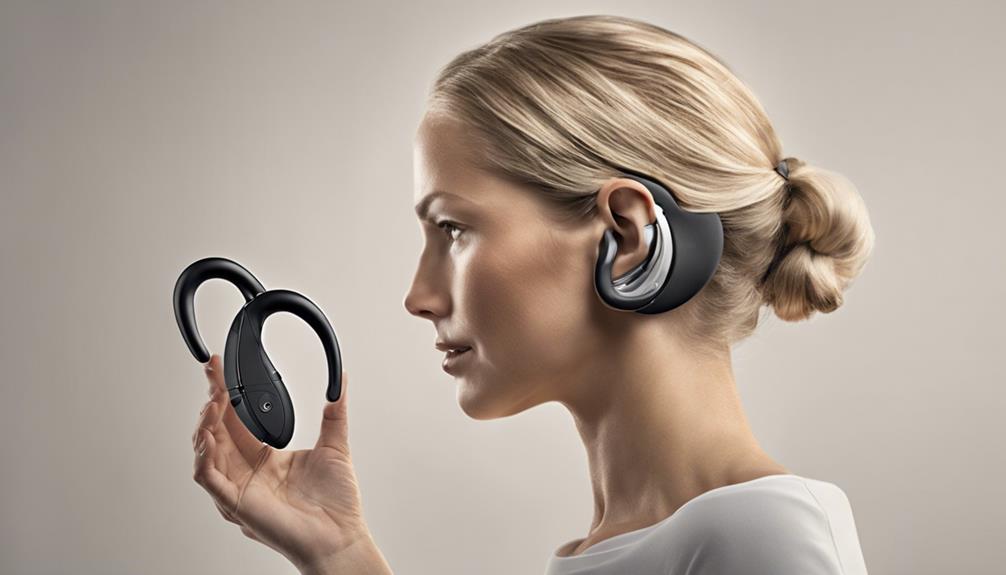Did you know that worldwide, over 700,000 cochlear implant surgeries have been performed? These implants have revolutionized how individuals with hearing loss experience sound.
As we explore the realm of international cochlear implants, there are ten crucial facts that shed light on their impact across borders and cultures.
From global availability to the latest advancements, understanding these key points can broaden our perspective on the significance of cochlear implants on a global scale.
Key Takeaways
- Cochlear implants are globally available, addressing hearing impairment worldwide.
- Advancements in technology lead to smaller, more discreet devices.
- Regulatory compliance ensures safety and quality for global implantation.
- Cultural diversity influences acceptance, requiring tailored awareness programs.
Global Availability of Cochlear Implants
Cochlear implants are globally accessible hearing solutions available in over 100 countries, ensuring widespread availability for individuals with hearing loss. These implants represent a crucial technological advancement in addressing hearing impairment, particularly in underserved populations. Countries such as the United States, Australia, and the United Kingdom have embraced cochlear implantation programs, leading to high rates of adoption and availability. The World Health Organization (WHO) actively promotes the use of cochlear implants as part of its global hearing health initiatives, emphasizing the importance of accessibility to such devices worldwide.
In recent years, developing countries have increasingly recognized the significance of cochlear implants in addressing hearing loss as a public health concern. Through international collaborations and partnerships, efforts have been made to extend the reach of cochlear implants to underserved populations in various regions. These initiatives aim to bridge the gap in access to hearing solutions, ensuring that individuals from diverse backgrounds have the opportunity to benefit from this life-changing technology.
Diversity in Cochlear Implant Technologies

Amid the diverse landscape of cochlear implant technologies globally, manufacturers worldwide offer a wide array of features and options to cater to varying needs and preferences. The diversity in cochlear implant technologies is evident in the following ways:
- Variety of Features: Different cochlear implant models come with various features such as improved sound processing capabilities, connectivity options, and battery life.
- Size and Design: International advancements have led to smaller and more discreet cochlear implant devices, providing users with greater comfort and aesthetics.
- Brand Prioritization: Some countries prioritize specific cochlear implant brands or models based on factors like research outcomes, reliability, and cost-effectiveness.
- Regulatory Variances: Different regions may have unique regulations, reimbursement policies, and access to the latest cochlear implant innovations, influencing the availability of certain technologies.
- Global Collaboration: Collaboration among international experts and institutions plays a significant role in the development and sharing of best practices in cochlear implant technology, ensuring advancements benefit users worldwide.
International Regulations and Standards
Global Regulatory Compliance ensures that cochlear implants meet safety and quality standards worldwide. Harmonizing Implant Standards across borders streamlines certification processes for manufacturers.
Cross-border certification processes, like the FDA in the US and CE marking in Europe, play a crucial role in ensuring market approval for cochlear implants.
Global Regulatory Compliance
In various countries and regions worldwide, the regulations governing cochlear implants play a crucial role in determining device approval and usage. Ensuring compliance with global standards such as ISO 13485 and IEC 60601 is vital for market access and patient safety.
Key points to remember about global regulatory compliance for cochlear implants include:
- Regulatory bodies like the FDA in the US and CE marking in Europe ensure safety and efficacy standards are met.
- Different countries may have specific requirements for clinical trials, post-market surveillance, and labeling.
- Harmonization efforts aim to align international regulations to facilitate access to cochlear implant technology worldwide.
Compliance with these standards is essential to provide safe and effective cochlear implants to individuals around the world.
Harmonizing Implant Standards
Efforts to harmonize international regulations and standards for cochlear implants focus on ensuring consistent safety and quality standards globally. International regulations play a crucial role in guaranteeing that cochlear implants meet specified safety standards across different countries. Harmonization efforts seek to streamline approval processes, making it easier to access implant technology worldwide.
These standards cover various aspects such as device performance, reliability, and adherence to international guidelines. Collaboration among regulatory bodies is key to enhancing information exchange and promoting best practices in implant development. Compliance with international regulations not only ensures the safety and quality of cochlear implants but also builds trust among users, healthcare providers, and manufacturers in the global cochlear implant market.
Cross-border Certification Processes
To ensure cochlear implant safety and quality meet international standards, manufacturers must navigate complex cross-border certification processes. When dealing with cochlear implants, the certification process involves compliance with international standards such as ISO 13485 and specific country regulations. This ensures that the devices meet the necessary quality and safety requirements.
Manufacturers must adhere to strict guidelines for product approval and distribution in different countries, which can be a challenging task. Collaboration between regulatory bodies is crucial as it facilitates mutual recognition agreements, leading to smoother market access for these vital devices. Harmonization efforts are ongoing to streamline approval processes and reduce barriers for global cochlear implant availability.
Cultural Perspectives on Cochlear Implants

Cultural diversity significantly shapes perspectives on cochlear implants, reflecting a wide range of beliefs, traditions, and societal norms. In some cultures, there may be a strong emphasis on traditional methods of coping with hearing loss, leading to lower cultural acceptance of cochlear implants. Attitudes towards communication disorders and the use of technology to address them can vary greatly across different regions, influencing the adoption rates of cochlear implants.
While some communities prioritize alternative modes of communication and support systems, others may view cochlear implants as a vital solution.
To address these cultural differences, awareness and education programs tailored to specific cultural contexts are crucial. By providing information and resources that resonate with local beliefs and values, these initiatives can help increase acceptance and utilization of cochlear implants globally. Collaborations between international organizations and local communities play a pivotal role in breaking down cultural barriers and promoting access to cochlear implant technology worldwide, ensuring that individuals from diverse cultural backgrounds can benefit from these life-changing devices.
Cost and Access to Cochlear Implants Worldwide

The cost of cochlear implants fluctuates globally. Prices range between $8,000 and $100,000 per implant. Availability of implants worldwide can be influenced by factors such as healthcare infrastructure and affordability.
Access to implant services may be limited in certain regions, affecting individuals in need of this technology.
Global Implant Affordability
Improving global affordability and access to cochlear implants remains a critical challenge in the realm of hearing healthcare.
- The cost of cochlear implants ranges from $25,000 to $100,000 per implant worldwide.
- Low-income countries face limited access to cochlear implants due to high costs and lack of insurance coverage.
- Organizations and charities provide financial assistance or subsidies for cochlear implants in developing nations.
- High-income countries typically offer better access to cochlear implants through insurance coverage and government support.
- International initiatives are underway to enhance affordability and access to cochlear implants for individuals globally.
Implant Availability Worldwide
With over 600,000 recipients worldwide benefiting from cochlear implants, the varying costs and accessibility of this technology across different countries underscore the global landscape of implant availability.
The cost of cochlear implants fluctuates globally, with some nations offering coverage through their healthcare systems, while others necessitate out-of-pocket payments.
Access to cochlear implants is on the rise in numerous developing countries, thanks to various initiatives, partnerships, and advocacy campaigns. Organizations such as the World Health Organization (WHO) are actively working to boost awareness and availability of cochlear implants in underserved regions.
International collaborations and funding opportunities support programs that strive to provide cochlear implants to individuals in need, irrespective of their geographical location or financial circumstances.
Access to Implant Services
Accessing cochlear implant services globally presents varying challenges due to the significant cost implications associated with the surgery and devices. While the cost of cochlear implant surgery and devices can reach up to $100,000, there are avenues for financial assistance such as insurance coverage or government programs like Medicare.
However, access to implant services differs worldwide, with disparities in availability and affordability across countries. Some regions lack the necessary resources or infrastructure for cochlear implantation, limiting access to this transformative technology. Efforts through advocacy and awareness campaigns strive to enhance access to cochlear implants for individuals in underserved communities internationally.
- High cost of cochlear implant surgery and devices
- Insurance coverage and government assistance options
- Disparities in availability and affordability globally
- Limited resources and infrastructure in certain regions
- Advocacy and awareness campaigns for improved access
Multilingual Support for Cochlear Implant Users

Incorporating multilingual support within the cochlear implant ecosystem enhances accessibility and user experience for individuals with diverse linguistic backgrounds. Many cochlear implant manufacturers recognize the importance of catering to diverse language needs by offering resources, manuals, and customer support in multiple languages. This initiative aims to provide better understanding and assistance to users worldwide. Moreover, programming software, apps, and online tools are available in various languages to ensure user convenience and seamless interaction with the technology.
Furthermore, multilingual customer service teams play a vital role in assisting global users by providing troubleshooting and support in different languages. This tailored approach enhances the overall user experience and fosters a sense of inclusivity within the cochlear implant community. Additionally, international clinics offering cochlear implant services prioritize multilingual support to ensure clear communication and optimal care for all patients, regardless of their native language. This commitment to linguistic diversity underscores the industry's dedication to serving individuals with hearing impairments on a global scale.
Success Rates of International Cochlear Implants

Global implant outcomes vary significantly across countries, showcasing diverse international surgery results. Factors such as surgical proficiency, aftercare quality, and patient compliance play crucial roles in determining success rates.
Collaborative efforts and ongoing research contribute to enhancing cochlear implant technology and efficacy worldwide.
Global Implant Outcomes
Across various countries, the success rates of cochlear implants differ, showcasing notable achievements in countries like Australia, the United States, and the United Kingdom. International collaborations are enhancing the availability and success of cochlear implants worldwide.
Developing countries are increasingly performing cochlear implant surgeries, improving access to hearing technology. Early implantation in children is crucial for better outcomes, emphasizing the importance of global awareness and intervention programs.
Advancements in cochlear implant technology continue to improve outcomes globally, benefiting individuals of all ages. These factors highlight the significance of ongoing efforts in research, education, and technology to enhance global implant outcomes and ensure better hearing health for individuals worldwide.
International Surgery Results
How do international cochlear implant success rates compare across different countries?
Success rates typically range between 80-95% in adults and 85-95% in children worldwide. Variations in surgical outcomes and post-operative experiences exist among different nations due to factors like surgical techniques, device quality, and rehabilitation protocols.
International collaborations and research efforts play a crucial role in enhancing cochlear implant outcomes on a global scale. By monitoring and reporting international cochlear implant success rates, we can evaluate the effectiveness of implant programs globally, ensuring continuous improvement and standardized practices.
This emphasis on collaboration and data-driven assessment serves to optimize outcomes for individuals undergoing cochlear implant surgery across various countries.
International Research and Advancements in Cochlear Implants

Have international research efforts in cochlear implants resulted in significant advancements in technology for individuals with hearing loss? Definitely. International collaboration in the field of cochlear implants has led to remarkable progress, benefiting those with hearing loss worldwide. Here are some key points to consider:
- Global research has driven advancements in cochlear implant technology, enhancing speech understanding and overall quality of life for recipients.
- Collaborative efforts across borders have enabled the development of innovative features in cochlear implants, catering to diverse populations with varying needs.
- International studies have demonstrated the effectiveness of cochlear implants in different cultural and linguistic contexts, emphasizing the importance of making this technology accessible globally.
- Multinational clinical trials have showcased the benefits of cochlear implants across various demographics, contributing to the widespread acceptance of this hearing solution.
- Ongoing international initiatives are focused on raising awareness and improving access to cochlear implants, aiming to provide transformative hearing solutions to individuals around the world.
Challenges in Implementing Cochlear Implants Globally

As we shift our focus to the challenges in implementing cochlear implants globally, it becomes evident that limited access, scarcity of trained professionals, and cultural barriers present significant obstacles to the widespread adoption of this transformative hearing technology.
In low- and middle-income countries, high costs and inadequate infrastructure result in limited access to cochlear implants. Moreover, there's a shortage of professionals trained in cochlear implantation techniques, further impeding global implementation efforts.
Awareness campaigns are crucial to address this gap and educate communities about hearing loss solutions, promoting acceptance and uptake of cochlear implants. Cultural perceptions and stigmas surrounding hearing loss also play a role in hindering the adoption of cochlear implants in some regions.
Government collaboration with organizations and manufacturers is essential to overcome these barriers, improve accessibility, and ensure that cochlear implants reach those in need worldwide. By addressing these challenges through training professionals, awareness campaigns, cultural sensitivity, and government collaboration, the path to global cochlear implantation can be paved more effectively.
Future Trends in International Cochlear Implants

Advancements in international cochlear implant technology are driving improvements in speech understanding and sound quality. Research is focused on enhancing sound quality, increasing implant longevity, and reducing surgical risks. International collaborations aim to expand access to cochlear implants in underserved regions. Telemedicine and remote programming are emerging trends for post-implantation care and support. Innovations in electrode design and signal processing algorithms are driving improvements in cochlear implant outcomes globally.
- Enhancing sound quality through advanced technology
- Increasing implant longevity for prolonged benefit
- Reducing surgical risks for safer procedures
- Expanding access to underserved regions through international collaborations
- Implementing telemedicine and remote programming for improved post-implantation care
These trends signify a promising future for cochlear implant recipients worldwide, as ongoing advancements continue to enhance outcomes and accessibility while minimizing risks associated with implantation.
Frequently Asked Questions
What Is an Interesting Fact About Cochlear Implants?
One interesting fact about cochlear implants is that they can provide individuals with profound deafness the ability to hear and understand speech, significantly improving their quality of life.
These devices work by directly stimulating the auditory nerve, bypassing damaged parts of the inner ear.
This technology has a high success rate in restoring speech understanding and communication abilities, making it a valuable solution for those with severe hearing loss.
What Do I Need to Know About a Cochlear Implant?
When considering a cochlear implant, it is important to understand both its benefits and limitations. These devices can greatly enhance hearing for individuals with severe hearing loss, improving their overall quality of life. However, it is essential to recognize that cochlear implants are not a universal solution and may not be effective for everyone.
Consulting with an audiologist and gaining a thorough understanding of the implantation process are crucial steps in evaluating whether a cochlear implant is the appropriate option for an individual.
What Are the Facts About the Cochlea?
The cochlea is a vital structure in our inner ear that plays a key role in converting sound vibrations into electrical signals.
It houses hair cells responsible for detecting sound waves and transmitting them to the auditory nerve.
This spiral-shaped organ's design allows for the discrimination of various sound frequencies and volumes.
Damage to the cochlea can lead to hearing loss, but cochlear implants offer a solution by directly stimulating the auditory nerve to restore sound perception.
What Are Three Facts About the Bionic Ear?
Sure thing!
Three key facts about the bionic ear are:
- it directly stimulates the auditory nerve, enhancing sound perception;
- it can significantly improve speech understanding for individuals with severe hearing loss; and
- its technology has evolved to deliver better outcomes and quality of life.
These advancements bypass damaged parts of the ear, creating a more direct pathway for sound signals to reach the brain.
This life-changing technology offers many the chance to reconnect with the world through sound.
Conclusion
In conclusion, the world of international cochlear implants is vast and ever-evolving. As we navigate the complexities of global availability, diverse technologies, and cultural perspectives, we must strive for continued success and advancements.
Like a symphony of progress, let's harmonize our efforts to ensure that individuals worldwide have access to life-changing cochlear implants, enhancing their quality of life and fostering a future of inclusive hearing healthcare.











